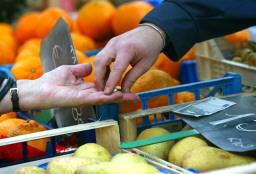Italy's renowned Mediterranean diet is under threat from the current crisis in food prices, the country's two top farming unions said on Tuesday.
Commenting on an article in US daily the Wall Street Journal, Coldiretti and the Italian Agricultural Confederation (CIA) said soaring prices and stagnant salaries were depriving many Italians of their traditional diets.
''Six households in 10 - more than 50% - changed their eating habits in 2007,'' said CIA. ''This is above all due to the rise in prices, particularly in basics such as bread and pasta.
''This change in eating habits is hitting the so-called Mediterranean diet hardest, with a sharp drop in the sale of key products this year''.
Both farming groups noted that the consumption of staples in the health-giving Mediterranean diet had plummeted over the last year.
Pasta sales were down 2.5%, vegetables 5.5% and bread 5.5%, said Coldiretti.
CIA quoted figures by agricultural research institute ISMEA, which also showed worrying drops in the sale of fruit (1.8%) and olive oil (down 5%).
''Around 7.5 million Italians live in relative poverty, a situation which is aggravated by the current rise in prices,'' said the Coldiretti.
According to Coldiretti, older people and large households had been hit hardest by the rise in prices.
''The increases are mainly affecting people over 64 and couples with three or more children, who spend around 21.9% of their income on food,'' said the organization.
This currently amounts to around 467 euros a month but the figure is set rise rapidly over coming months, said Coldiretti.
The report in the Wall Street Journal, entitled ''Arrivederci penne?'', suggested that low-income Italian families were increasingly neglecting traditional Mediterranean food in favour of cheaper, ready-made or fast-food alternatives.
''The soaring costs of pasta, bread, fruit and vegetables are making Italy's famed Mediterranean diet harder to afford in a country that prides itself on its healthy cuisine,'' said the article. ''Italians, in turn, are dining more on cheap processed foods high in fat, sugar and salt ''.
''This article has hit the nail on the head, highlighting the great difficulties Italian families currently face in buying food,'' commented CIA.
The benefits of the Mediterranean diet were first hailed over 60 years ago, when a US scientist stationed in Salerno started examining the correlation between health and food.
But it was not until the 1990s that the diet achieved widespread recognition, despite several important corroborating studies in between.
Today, the low-fat, high-fibre Mediterranean diet is considered one of the best recipes against health problems such as arthritis, obesity, diabetes, asthma and cardiovascular disease.
Cereals, olive oil, certain fish such as anchovy and tuna, and a high fruit and vegetable intake, including tomatoes, broccoli and blackberries, are thought to be among its important features.









